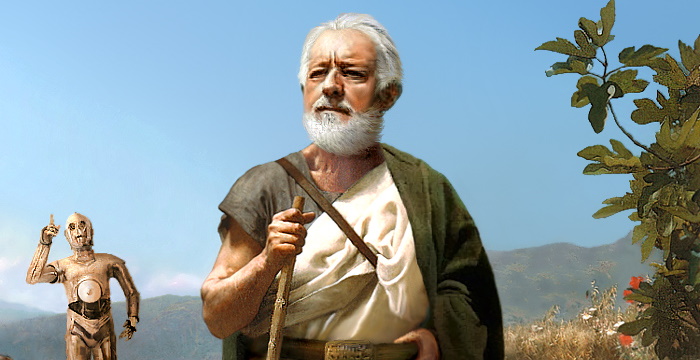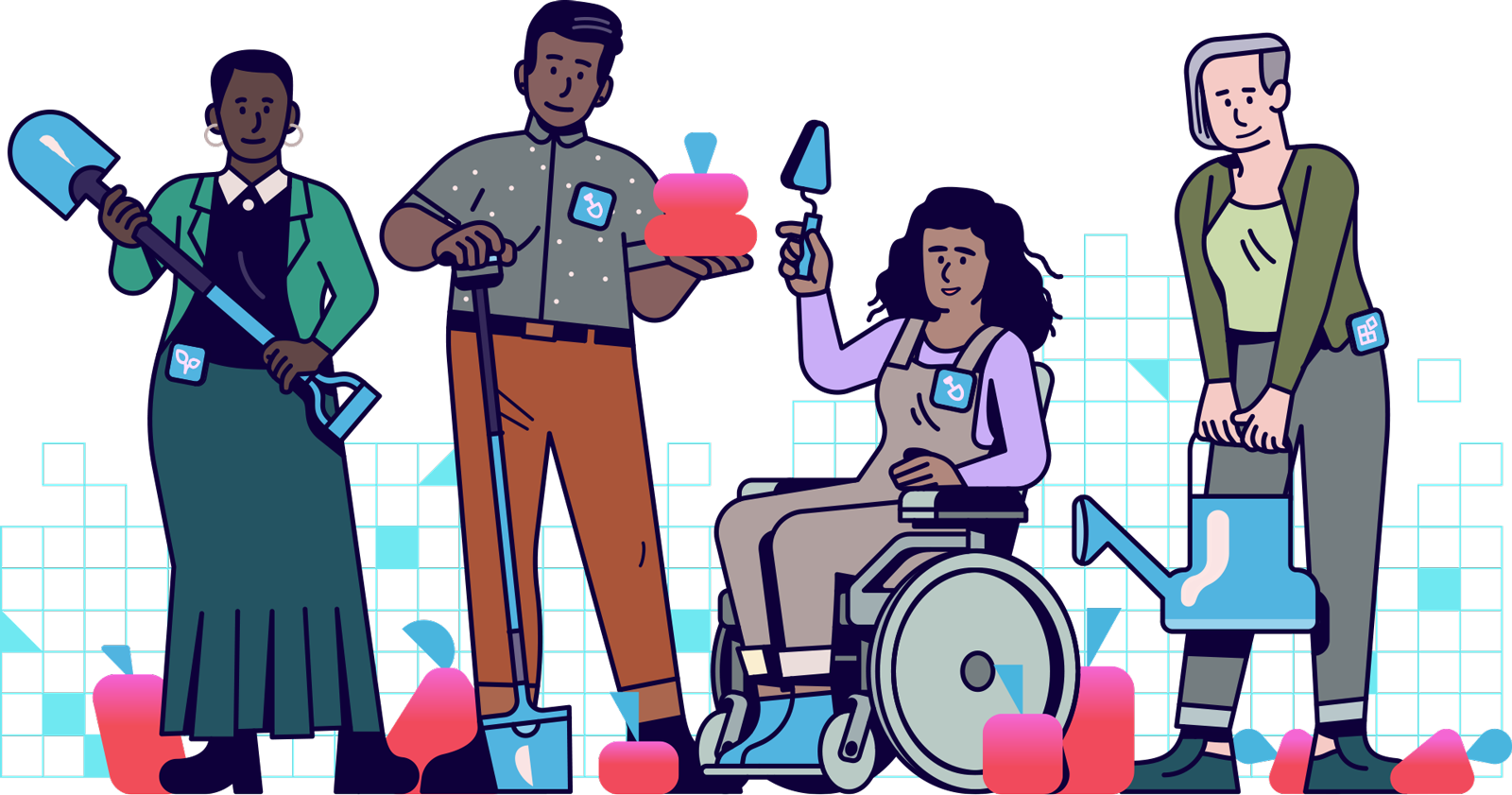
Or be like Yoda if you prefer. Either way Catalyst is calling for agencies to always be mentors to charities, not just their technical experts.
When Luke Skywalker left Tatooine he vowed to learn the ways of the force and become a Jedi.
When charities leave the world of traditional services they get invited to learn the ways of service design and become digital service providers.
And, just like Luke couldn’t without Obi-Wan, they can’t learn without your help.
So if you work for an agency, you’re going to need to do more than just deliver a project. The people working for your charity partner are also your padawans. It's your job to mentor them. Do it well and everyone benefits, including you.
What this blog will do
This blog will explain the benefits of adding a mentoring role to how you work. It’ll also show you some easy ways to skill up and empower your charity padawans. It’s what agencies on the Discovery programme are doing and it's what Catalyst will be looking for from the agencies joining its Develop programme.
The qualities of being Obi-Wan
Obi-Wan, Yoda, Qui-Gon Jin, even Padme. All were mentors; all showed some or all of the following:
- Being willing to share their knowledge and experience with a less experienced companion
- Instructing them in how to perform moves and skills
- Being a role model
- Fostering an attitude of self-reliance
- Helping them be aware of their impatience, resistance or any drawback of being inexperienced
- Helping them to see their inherent talents
Of course you’re also expecting charities to be willing to learn, to want to listen to your wisdom and develop their digital design skills. For this you’ll need to earn their trust. The best way to do this is to be open, probably more than you would with a commercial partner.
Being like Obi-Wan has benefits
Taking on the mentor role has immediate and long-term benefits for your agency. Some will emerge as the work progresses. Others, like being able to work faster together, will emerge next time you work together. Ironically if you mentor them well your relationship is likely to last a lot longer than Luke and Obi-Wan’s.
Here’s seven benefits noted by Ellie Hale and Charné Tromp of CAST (incubator of Catalyst):
Mentoring creates better conversations: because they’re learning how to do some of the things you do, they get to know your language and begin making more informed observations. Conversations become more generative and participative.
It makes working together easier: as their confidence grows you’ll need to do less handholding. As their understanding of the design process develops their expectations become more grounded in what’s possible. This makes scoping and prioritising easier.
It creates better outcomes: the more they learn about the force digital design while under your wing, the better they get at keeping up. This means you can go faster and further towards better outcomes.
They are more likely to work with you again: through your care for their growth and skills development they trust you more. Trust wins repeat business.
It feels good: building your partner’s capacity to use digital for social good will nearly always be more rewarding than commercially focused work
It's ethical: it feels right. Charities tend to work with smaller development budgets than commercial businesses. So teaching them how to do things themselves helps them make their budget with you go further.
You get to work on more technical and specialised tasks: when they’re able to do more themselves, you get more time to work on specialised tasks like coding and product management
You’re mentoring people, not organisations
Let’s pause a moment. We’ved talked so far about mentoring charities as if they were a person like Luke Skywalker. But charities a charity is an organisation, not a person. What you’re actually doing is mentoring people: padawans.
Your main padawan is likely to be the charity’s project lead. They might also be the organisation’s assigned or de-facto digital lead.
However, other people need your influence too: stakeholder padawans.
Stakeholder padawans might be senior managers or other important stakeholders. You need to also get them in the room and learning from you. This will make delivering the project easier.
Nine moments to be a magnificent mentor and channel your inner Obi-Wan
After they left Tatooine, Obi-Wan taught Luke core Jedi skills, but also modelled a way of life. It’s the same for you. Mentoring is about role modelling and looking out for teachable moments. Moments when you can impart wisdom, teach a skill, build self-belief or point out talents.
These moments may be predictable - Obi-Wan always knew Luke was going to need to learn to use a light saber. Or they may be unpredictable, occurring spontaneously, often when challenges arise. Obi-Wan hadn't planned to come across the Death Star.
Here’s some moments to be a mentor:
1. User research
A big opportunity to be like Obi-Wan. User research is the foundation of any digital project. Doing it with your padawan can create a foundation for your relationship too. Here’s some extra resources.
2. Writing user need statements
This is a crucial moment for shifting your padawan’s mind-set. When you share your knowledge and experience of user stories it helps them shift from thinking about ‘lists of unvalidated features’ to thinking about ‘statements of user need’. You’re helping them over the threshold and into the world of digital design.
3. User testing
Anyone can learn to run a testing session. We’ve seen padawans learn how to put existing tools, paper prototypes and wireframes in front of users and ask validation questions. As a mentor you can show your padawan how and encourage them to try it solo.
4. Scoping
Charities often want to include a lot of things in a project or sprint’s scope. When you teach your padawan and their stakeholder padawans how to decide what's out of scope you’re modelling the belief that it's ok to leave things out for now.
5. Prioritising
When it's time to focus on what to test or develop next then you’ve an opportunity to teach your padawan how to focus on the things that matter most. When they learn to prioritise they become more confident in spending their budget with you.
6. How to write for the web
Every prototype or service uses words. But many charities don’t have people who know how to design content or write for the web. So when it's time to write some button or interface text, or even a service description, show your padawan how to shape a sentence for easy online reading.
7. Documentation
As a mentor you can empower your padawans to take responsibility for basic maintenance and tweaks to any tech you reuse or create with them. Make guides and videos showing them how. Reassure them that they can’t break it. Show them that you believe in them.
8. Noticing their skills
It’s easy for padawans to see you as the expert. But they will have skills too. You want their analytical mind, their creativity, and their desire to do what is best for their users at the fore of the project. Affirm this to them so their confidence grows.
9. Believing
If you don’t know how else to mentor in any moment, just try and show your padawans you believe in them. Place the belief they have placed in you back in their hands.
Join us
We're seeking digital agencies to join our ‘Develop’ programme funded by the National Lottery Community Fund’s COVID-19 Digital Response initiative. If you think you could deliver a developer service while mentoring a charity at the same time then we’d love you to apply. Check out our Open Projects page next week.
Hat-tips to Ellie Hale and Charné Tromp for their input into this article.
Image courtesy of Mark Rain.

Support & services
Our free services help you make the right decisions and find the right support to make digital happen.
Learn what other non-profits are doing
39+ organisations share 50+ Guides to how they use digital tools to run their services. Visit Shared Digital Guides.



